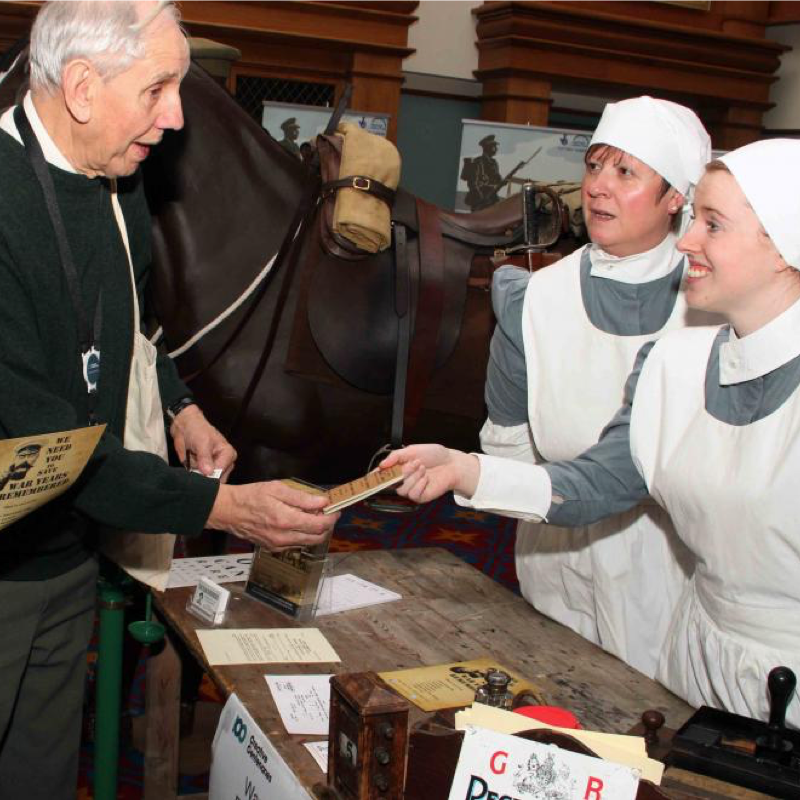What is Commemoration?

Commemoration marks out the special from the ordinary, or the extraordinary, from the every day and acts of commemoration, is about retaining in the memory or committing to the memory, events, developments and people from the past. When we mark anniversaries or other important historical or cultural movements (e.g. labour or equality movements), we assign meaning to an event, occurrence, or lives of individuals or groups that we deem to be important to who we are as a society.
There are many commemorative practices relating to the conflict in and about Northern Ireland. These take many forms, including:
Fixed or semi fixed physical memorials and/or murals;
Memorial services and timed remembrances;
Marches and parades;
Music and song or memorial books;
The arts – i.e. artwork,storytelling, drama;
Endowments / commemorative organisations, foundations, awards and medals;
Web-based or physical archives; and
Physical spaces for the collection of commemorative materials
But commemoration can be a mixed bag. On one hand, commemoration can be an enjoyable experience that opens up historical events in a way that makes a personal impact. Commemoration can also promote acknowledgement by pointing to a legacy of the past that still has importance for today and can be beneficial to a society because it has potential to help develop or renew relationships between opposing groups by working together to bring conflicting views of history together for a shared purpose.
On the other hand, commemoration can also be difficult, divisive or painful. Many times commemoration is used to ritualise and harden the boundaries between groups who have been in conflict, which causes further division. Sometimes competing groups try to control the meaning of particular commemorations, and some can feel that the story about certain historical events gets taken over by other groups for their own purposes. Also, commemoration can lead to the forgetting of other dimensions of historical fact that contradict or complicate the agreed story.
The role of forgetting in relation to commemoration is often overlooked, but forgetting isn’t always a bad thing. Concern about forgetting what happened in the past often fuels conflict about commemorations between communities as each seek to remind themselves and each other of historic grievances
But that same concern about forgetting the past also has the potential to encourage actions and draw communities together to ensure such grievances don’t occur again.
At certain times, depending on what issues are being dealt with in society, certain commemorations carry more weight than others, and what may have been forgotten in the past becomes important. On the other hand, commemorations often shape society by continuing to emphasise what is valued through annual observance of particular events. As a result commemoration can often vary in popularity depending on current social and ideological needs.
Being sensitive to this relationship between culture, society and commemoration creates space for thinking about the ways we can commemorate in a positive way. Marking the importance of certain events, movements, or people allows us to remember those who have gone before as well as giving us the opportunity to imagine ways to consider the past and shape society for a better future.
Principles for commemoration which underscore this toolkit was developed in partnership by the Community Relations Council (CRC) and the Heritage Lottery Fund (HLF) in order to inform upcoming events related to the Decade of Anniversaries:
Start from the historical facts;
Recognise the implications and consequences of what happened;
Understand that different perceptions and interpretations exist; and
Show how events and activities can deepen understanding of the period.
All to be seen in the context of an ‘inclusive and accepting society’
These principles were developed over the course of two years as a method that could assist both CRC and HLF as well as others involved in Decade of Anniversaries events, informing practice and providing guidance for the development of commemorations.
The origin of these best practice principles is found in discussions held both between CRC and HLF as well as roundtable discussions with a wide range of individuals and groups (including historians, commentators, community groups, government, museums and heritage services, etc.) between 2010 and 2011. Seminal to their development was the ‘Remembering the Future’ conference organised by CRC and HLF on 21 March 2011 as the beginning of a conversation which raised the issue of remembering in a public space in light of the Decade of Anniversaries.
The process of developing the principles enabled organisations connected with the CRC and HLF to engage with issues around culture and identity, rights, concepts of democracy, and political change as well as acknowledging the legacy of the conflict in the context of Northern Ireland. The principles were then formally adopted in 2011 and have since been distributed and utilised in on-going Decade of Anniversaries commemorative events.


